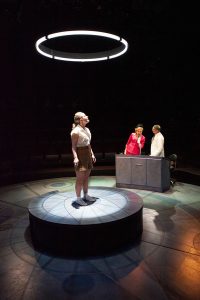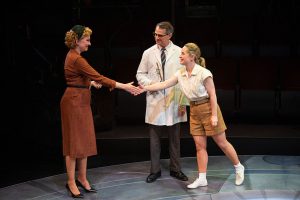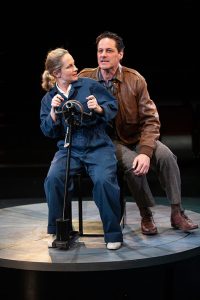Women Were Late in Space As Globe Play Details But Now We All Are Lagging
Mankind sent a few missions to the moon and brought everybody home, with samples. But that was over half a century ago and we haven’t bothered to return. Or go anywhere off-world, for that matter.
Why not? That’s the fascination of the story. What a great idea for a play, especially considering that dominant central mystery.
The Old Globe Theatre, presently on a roll introducing neat new plays, has turned its practiced eyes to the skies with a perky production of Laurel Ollstein’s They Promised Her the Moon, about an appealing woman who never became part of the program…because she was female.
Huh? What does that have to do with mankind’s indifference to space exploration? Jerrie Cobb, the pilot center stage, never left gravity but neither did thousands of other dreamers, many of whom had their ambitions crushed as much as she did or even more.

Morgan Hallett as Jerrie Cobb with Mary Beth Fisher and Matthew Boston in They Promised Her the Moon at The Old Globe. Jim Cox Photos
Sixty or more women are prominent among the 560 humans who have flown in space and more are part of the thousands – from 37 nationalities, various races, scientific and engineering qualifications, civilian and military status, aviation skills and so forth – who haven’t quite made it.
But Ollstein has chosen to ignore all this and write Cobb’s story as yet another gender lament in the presently popular style. Thus, instead of puzzling over whatever combination of cultural, psychological, economic and emotional glue keeps us stuck on the ground, the author polishes again the romance of flight, stubborn drive of ambition, the unfairness of discrimination, the influence of parental prejudice, the realities of progress and etc., etc., etc.
NASA (National Aeronautics and Space Administration) has accumulated a lot for future historians to ponder since a primitive lurch to get something (and later somebody) up after the rival Russians did in the late 1950s and early 60s.
According to aviation lore, that tiny Mercury 7 capsule originally was viewed as little more than an experimental cage such as the one containing chimpanzees in early tests of the hardware, until the seven stalwart astronauts – Alan Shepard, John Glenn, Gus Grissom and the others – went on strike, demanding some kind of control to justify that exhaustive selection and training process. All the fuss over test-pilot status and university engineering degrees was just more sexy window-dressing for the American heroes.
But that’s the system that kept Jerrie Cobb and the other 23 female astronaut applicants stymied: Women were not allowed to fly jet aircraft, much less work as test pilots, so none of them qualified for consideration.
There were Congressional hearings (very few women elected back then) and lots of wry pundit comment (few women there either) but the prevailing attitude was expressed by Astronaut (later Sen.) John Glenn: “The fact that women are not in this field is a fact of our social order.”
The test-pilot rule was soon dumped. Women became (and remain) part of the international space corps. Any details of how many get what assignments probably depend on politics. Certainly, that’s the game that must be played to fund our feeble and failed efforts to return to space. Maybe the final word on the subject should come from the resident scientist in Ollstein’s play:
“Look – I don’t care who goes up in space. If it’s you or John Glenn. Except for the fact that he weighs 79 pounds more, and that means I could have put 79 more pounds of my equipment in that can.”
As to the politics of this story, well, that’s why the late Jackie Cochran is involved. A classic big talker who delivers, Cochran was wining air races in the 1930s as an aviatrix more glamorous than Amelia Earhart and certainly more the survivor. She married a rich businessman and started her own cosmetics line, Wings to Beauty. During World War II, she talked President Roosevelt and his generals into letting her create and manage the Women Airforce Service Pilots (WASP) to put women pilots to work in non-combat flying assignments. After the war, she moved over to the Air Force, as its first female pilot, and continued setting aviation records.
She wanted to be the first woman to break the sound barrier. The Air Force wouldn’t let her use a jet fighter so she arranged to borrow one from Canada and in May, 1953, with the famed test pilot Chuck Yeager as wingman, she flew at 653 mph, getting her sonic boom. According to published records, she still holds more distance and speed records than any pilot, living or dead, male or female.

Mary Beth Fisher, Matthew Boston and Morgan Hallett as Jerrie Cobb in They Promised Her the Moon at The Old Globe.
Obviously, she was the one to head the campaign for female astronauts. And she did, up to the point where she either (a) perceived that the politics made it impossible at the moment or (b) there was no way she could be the star of the effort. Maybe both. Anyway, to the distress of Jerrie Cobb (and probably many others), she bailed. So it was back to the gamesmanship for the Sally Ride generation.
As for Cobb, she embarked on a career of daredevil flying exploits supplying Christian missionaries in remote South America, to great acclaim, yes, but also in what Ollstein makes look like an extended fit of pique.
And the play They Promised Her the Moon becomes a conventional social tsk tsk instead of a serious study of ego versus id.
It’s also bright and lively theatre, though, with several nice performances by the Globe cast.
Laurel Ollstein is a nimble storyteller, able to hop about through flashbacks without losing the thread of the narrative or the interest of the audience. She bends reality to aid the art without betraying truth and her advocacy, once perceived and put into perspective, doesn’t really trip up the tale.
She also has an ace collaborator in director Giovanna Sardelli, who suggests meticulous planning in so casually juggling the play’s logistical needs. Sardelli also finds ways to help the author flesh out characters limited to a tight minimum of exposure, a skill essential in such a sprawling slice of life.
The four actors who provide support of this show probably deserve some kind of shared prize for versatility, playing as they must a range of roles from unruly first-graders to politicians, fans, parents, lovers and a broad assortment of period newshounds. Nothing particularly stands out –Matthew Boston is a stock scientist, Lanna Joffrey is homemaker mom, Peter Rini is leading jock etc. – but that’s sort of the point. Michael Pemberton does squeeze out some special poignancy as Jerrie’s dreamy dad but never outside his primary position as prop.
Morgan Hallett’s scrubbed radiance makes Jerrie the world’s favorite little sister in addition to a formidable striver and Mary Beth Fisher provides yeasty contrast as Jackie Cochran, the feral female on prowl. Their scenes together suggest the maze of paths available toward shared goals.
There’s a lot of delicious period detail (and considerable accuracy) in Denitsa Bliznakova’s costumes and the sound design of Jane Shaw includes not only a completely satisfactory assortment of aviation noise but also some sly touches like the inclusion, in a 1950s scene, of a tiny slice of Les Paul’s hit, “How High the Moon.”
It’s fascinating how set designer Jo Winiarski got all this compressed down to a package that fits the Globe’s White Stage arena but one reason is Cat Tate Starmer’s precision lighting and another is a squad of mostly unseen stagehands and dressers.
So the truth that women were not welcome at the birth of the Space Age is amply registered but still leaves unsolved the mystery of subsequent futility.
Maybe it’s just because, as Ollstein’s scientists says, “There’s a little too much of Icarus in all of us who fly.” That’s not gender politics. That’s humanity.
(Performances continue in the Old Globe White Theatre at 7 p.m. Tuesdays and Wednesdays; at 8 p.m. Thursdays-Saturdays; and at 2 p.m. Saturdays and Sundays through May 5, 2019.)

Welton Jones has been following entertainment and the arts around for years, writing about them. Thirty-five of those years were spent at the UNION-TRIBUNE, the last decade was with SANDIEGO.COM.



